Brexit: DUP orders halt to construction of permanent food import inspection posts in Northern Ireland
Agriculture minister Gordon Lyons says Brexit protocol ‘needs to be scrapped’
Your support helps us to tell the story
From reproductive rights to climate change to Big Tech, The Independent is on the ground when the story is developing. Whether it's investigating the financials of Elon Musk's pro-Trump PAC or producing our latest documentary, 'The A Word', which shines a light on the American women fighting for reproductive rights, we know how important it is to parse out the facts from the messaging.
At such a critical moment in US history, we need reporters on the ground. Your donation allows us to keep sending journalists to speak to both sides of the story.
The Independent is trusted by Americans across the entire political spectrum. And unlike many other quality news outlets, we choose not to lock Americans out of our reporting and analysis with paywalls. We believe quality journalism should be available to everyone, paid for by those who can afford it.
Your support makes all the difference.Northern Ireland’s agriculture minister has ordered officials to stop construction of permanent facilities for post-Brexit checks on agri-food goods arriving from Great Britain.
Gordon Lyons, a DUP assembly member for East Antrim, also ordered a halt of further recruitment of inspection staff and an end to charges levied at the ports on traders.
He said the move was in response to the “practical difficulties’’ and uncertainty caused by the Northern Ireland Protocol.
Irish Sea trade checks, which are taking place at existing repurposed port buildings and other temporary facilities, will continue. Mr Lyons' decision relates to ongoing work on new purpose-built inspection facilities.
The minister made the announcement in an interview with PA news agency, claiming his officials have been warning him that the port control posts are unlikely to cope when the regulatory grace period ends at the start of April.
He told PA that supply chains into Northern Ireland were also unlikely to hold up when the red tape increases on that date, adding: "It's a real nightmare for us and it's going to be causing us an awful lot of problems.
“The risk to Northern food supply in those circumstances will remain high so there’s a lot of practical difficulties with all of this and that’s causing us a huge amount of uncertainty.”
Mr Lyons said he believed his decision to halt work on the facilities was “a reasonable and proportionate step to take” and insisted the UK and EU had to find “permanent solutions” to the issues caused by the protocol.
He added: “My own point of view is I think the protocol needs to be scrapped, it is not working. The evidence we have so far shows it’s not working and it’s only going to get worse at the end of the grace period.”
However Sinn Fein deputy first Minister Michelle O’Neill branded Mr Lyons’s move a “stunt”. She tweeted: “The protocol is a consequence of Brexit. The DUP championed Brexit and must own the consequences. Business and society need certainty, not stunts.”
SDLP infrastructure minister Nichola Mallon questioned whether Mr Lyons could take the decisions without wider approval of the Stormont Executive, describing the move as “controversial and cross cutting”.
A UK Government spokesman said: “This is a matter for the Northern Ireland Executive. We remain in close contact with them.’’
New inspection facilities were being constructed by the Department of Agriculture, Environment and Rural Affairs to fulfil a legal duty under the terms of the Northern Ireland protocol agreed between the UK government and the EU after Brexit.
The protocol necessitates checks on goods entering the province from Great Britain and red-tape restrictions on the movement of goods have mounted despite previous assurances from Westminster that such trade barriers would not exist.
Earlier this week DUP leader Arlene Foster and other members of her party launched court action to argue that the new goods checks were imposed without public consent, claiming that the protocol was putting the Union at risk.
On Friday the party was accused of legitimising “malignant forces” after leaders met with an organisation representing loyalist paramilitary groups to discuss the protocol.

Join our commenting forum
Join thought-provoking conversations, follow other Independent readers and see their replies
0Comments